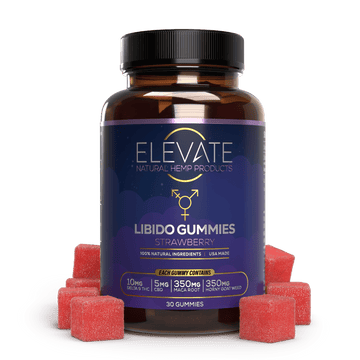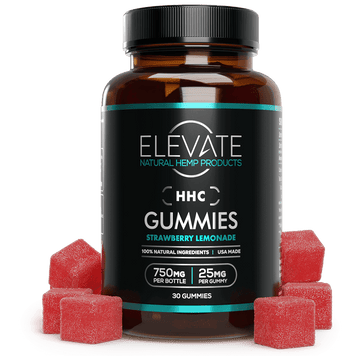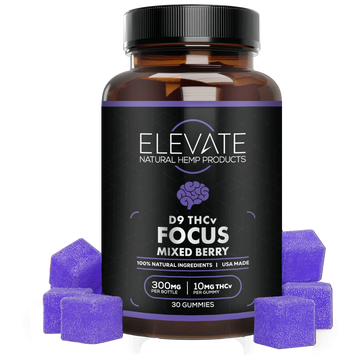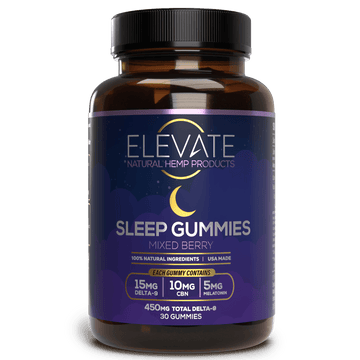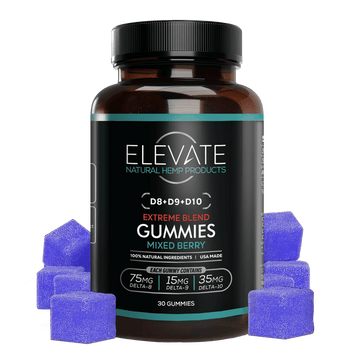As we explore the vast and ever-expanding world of cannabis, it’s easy to get lost in the sea of acronyms and terms that float around. Among these, THCa and Delta 9 THC stand out as two critical components that every cannabis enthusiast should be familiar with, especially if you’re looking to elevate your understanding and experience.
In this blog, we’ll dive into what THCa and Delta 9 are, and demystify the differences between them. So, whether you’re curious about the science behind your favorite delta 9 gummies or just looking to broaden your cannabis knowledge, you’re in the right place.
THCa vs. Delta 9
Tetrahydrocannabinolic acid, or THCa, is a non-psychoactive cannabinoid found in raw and live cannabis. As the precursor to delta 9 THC, the compound most people associate with the “high” of cannabis, THCa itself doesn’t produce intoxicating effects. Instead, it requires decarboxylation— a process of heating that converts THCa into THC, unlocking its psychoactive potential.
THCa is found in high concentrations in fresh cannabis plants, and its benefits extend beyond just being a precursor to THC. Studies have shown that THCa has anti-inflammatory and neuroprotective properties, making it a point of interest for medical research and wellness-focused cannabis consumers.
What is Delta 9?
Delta 9 THC, or delta-9-tetrahydrocannabinol, is the most well-known cannabinoid found in cannabis. It’s responsible for the psychoactive effects that cannabis is famous for, offering feelings of euphoria, altered perception of time and space, and in some cases, relief from symptoms like pain and nausea. When you consume cannabis in any form—smoking, vaping, or edibles like delta 9 gummies—delta 9 THC is the compound that’s primarily at play.
What is THCa?
Let's start with the basics. THCa, short for Tetrahydrocannabinolic acid, is a cannabinoid found in raw, freshly harvested cannabis plants. Think of it as the parent molecule to the more famous Delta 9 THC. On its own, THCa is non-psychoactive, meaning it won’t produce that classic “high” you might associate with cannabis. For that to happen, THCa needs a little heat. This process, called decarboxylation, happens when you smoke, vape, or bake cannabis. The heat changes THCa’s molecular structure, converting it into the psychoactive Delta 9 THC. This is why eating raw cannabis flower won’t have the same effect as consuming an edible made from it.
So, if THCa doesn't create a high, why is there so much buzz around it? The interest lies in its potential therapeutic benefits, separate from its role as a THC precursor. While research is still evolving, some studies suggest that THCa has powerful anti-inflammatory and neuroprotective properties. This has made it a focal point for wellness enthusiasts and medical researchers alike who are exploring its potential to help with conditions like arthritis, seizures, and nausea. It offers a way to tap into the potential health advantages of the cannabis plant without the intoxicating effects, making it a unique and versatile compound in the world of cannabinoids.
The science behind why THCa is non-psychoactive is fascinating. It all comes down to its shape. The THCa molecule is larger than a THC molecule and has a different three-dimensional structure, which prevents it from binding effectively with the CB1 receptors in our brain’s endocannabinoid system. These receptors are like locks, and Delta 9 THC is the key that fits perfectly to produce psychoactive effects. Since THCa doesn't fit, the effect isn't triggered. This distinction is crucial for anyone looking to tailor their cannabis experience. While some people seek out the effects of Delta 9 for specific outcomes like better sleep, others might prefer the potential wellness benefits of THCa without any cognitive alteration.
What’s the Difference between THCa and Delta 9 THC?
The main difference between THCa and Delta 9 THC lies in their chemical structure and physiological effects. THCa is a non-psychoactive acid form of THC, meaning it won’t get you high in its raw state. It requires heat to transform into Delta 9 THC, the compound known for its psychoactive properties.
This transformation occurs through a process called decarboxylation, where the application of heat removes a carboxyl group from THCa, converting it into THC. This is why raw cannabis won’t have the intoxicating effect many seek until it’s heated, such as when smoking, vaping, or cooking it into edibles.
Understanding the difference between these two cannabinoids is crucial for both consumers and medical patients. For those looking into cannabis for therapeutic purposes, knowing that THCa may have its benefits without the psychoactive effects can be particularly valuable. Meanwhile, recreational cannabis users or those seeking specific therapeutic effects from THC will find that products like Delta 9 gummies offer a convenient and controlled way to consume Delta 9 THC.
Effects and Benefits of THCa
THCa stands out for its potential benefits, primarily due to its non-psychoactive nature. Here’s what research and anecdotal evidence suggest about THCa:
Anti-Inflammatory Properties
THCa has been shown to possess anti-inflammatory capabilities, which could be beneficial for individuals suffering from conditions like arthritis, Crohn’s disease, and other inflammatory disorders. Its ability to reduce inflammation without psychoactive effects makes it an attractive option for those seeking relief without the high.
Neuroprotective Effects
Preliminary studies indicate that THCa may offer neuroprotective benefits, potentially aiding in the protection against neurodegenerative diseases such as Parkinson’s and Alzheimer’s. This aspect of THCa is being explored for its potential to safeguard brain health and function.
Anti-nausea and Appetite Stimulant
For patients undergoing treatments like chemotherapy, THCa has shown promise in reducing nausea and stimulating appetite, offering a natural means to mitigate some of the challenging side effects of such therapies.
Potential Anticancer Properties
Early research suggests that THCa might have anti-cancer properties, indicating its potential to inhibit the growth of cancer cells. Although this area requires more study, it opens up exciting possibilities for cannabis in cancer treatment strategies.
Safety and Non-Psychoactive Use
One of the most significant advantages of THCa is its non-psychoactive nature. In its raw state, it won’t produce the "high" that people usually associate with cannabis. This is because THCa only transforms into the psychoactive Delta 9 THC when it's heated, a process you might know as decarboxylation. This quality makes it an appealing option for anyone looking to explore the potential therapeutic benefits of cannabis, such as its anti-inflammatory or neuroprotective properties, without the intoxicating side effects. It’s a fantastic way to experience what the plant has to offer while keeping a clear head, making it a safe alternative for people who are new to cannabis or sensitive to THC.
Delta 9 Effects
Delta 9 THC, known for its psychoactive properties, offers a range of effects and benefits that have made it famous worldwide:
Pain Relief
One of the most celebrated benefits of Delta 9 THC is its ability to relieve pain, ranging from chronic pain associated with medical conditions to acute pain following injuries. Its analgesic properties make it a cornerstone of medicinal cannabis use.
Mood Elevation and Relaxation
Delta 9 THC is well-known for its ability to enhance mood and induce relaxation. This makes it particularly beneficial for individuals dealing with anxiety, depression, or simply looking to unwind after a stressful day.
Sleep Aid
For those struggling with insomnia or sleep disturbances, Delta 9 THC can serve as an effective sleep aid, promoting longer, more restful sleep.
Enhanced Appetite
Commonly referred to as “the munchies,” the appetite-stimulating effect of Delta 9 THC can be beneficial for patients experiencing appetite loss due to medical treatments or conditions.
Neurological and Mental Health Benefits
Beyond its immediate effects, Delta 9 THC has shown potential in treating symptoms related to PTSD, offering therapeutic benefits in managing certain mental health conditions.
Both THCa and Delta 9 THC offer a spectrum of benefits, highlighting the therapeutic potential of cannabis. Whether you’re interested in the non-psychoactive health advantages of THCa or the well-documented effects of Delta 9 THC, the cannabis plant continues to offer promising avenues for wellness and relief.
Potential Side Effects
While Delta 9 THC offers many positive effects, it's smart to be aware of potential side effects, especially if you're new to it. The most common ones are pretty mild, like dry mouth, red eyes, or a bit of dizziness. Because of its psychoactive nature, some people might experience temporary feelings of anxiety or paranoia, particularly with higher doses. This is why starting with a small amount, like half a gummy, is always a good approach. It allows you to see how your body reacts and find the right dose for your desired effect without overdoing it. Listening to your body is key to a positive experience.
THCa, on the other hand, is a different story. In its raw, unheated form, it’s non-psychoactive, so you won’t experience that classic "high" or the associated side effects. The potential for side effects with THCa really only comes into play when it's heated and converts into Delta 9 THC. So, if you're consuming raw cannabis juice or tinctures, you're unlikely to feel dizzy or anxious. Understanding this distinction is crucial for choosing the right product and consumption method for your wellness goals, ensuring you get the benefits you're looking for without any unwanted surprises.
Is THCa Stronger Than Delta 9?
In the raw cannabis plant, THCa is the abundant non-psychoactive precursor to Delta 9 THC. When we talk about strength, if you’re referring to the psychoactive “high,” then THCa isn’t “strong” at all because it doesn’t produce these effects in its natural state. It’s like comparing a stored energy drink that hasn’t been opened yet (THCa) to the rush you get once you drink it (Delta 9 THC). The process of decarboxylation, which involves applying heat, transforms THCa into Delta 9 THC, the compound renowned for its psychoactive prowess.
Delta 9 THC is the star of the show for those seeking the euphoric, mind-altering effects associated with cannabis. It’s the compound that has been both celebrated and scrutinized, given its potent psychoactive effects. On the other hand, THCa, in its raw form, is like the unlit fuse of a firework—full of potential but requiring a spark (heat) to truly come alive.
When you light up a cannabis flower, does THCa transform into Delta 9 THC?
This question taps into the fascinating chemistry that occurs when cannabis is consumed through smoking.
Indeed, THCa does convert into Delta 9 THC when smoked. This transformation is a result of a process called decarboxylation, which occurs when cannabis is subjected to heat. During smoking, the heat from the flame causes the THCa, which is non-psychoactive and abundant in raw cannabis flowers, to lose a carboxyl group (COOH) through decarboxylation. This chemical reaction changes the molecular structure of THCa, turning it into Delta 9 THC, the compound known for its psychoactive effects.
This conversion is crucial for users seeking the psychoactive effects of cannabis, as THCa on its own does not produce the “high” associated with THC. Through the act of smoking, the cannabis is effectively activated, unlocking its psychoactive potential and allowing users to experience the full range of effects that Delta 9 THC has to offer, from euphoria and relaxation to altered sensory perceptions.
So, in response to the question of whether smoking causes THCa to turn into Delta 9 THC: yes, it does. This chemical transformation is at the heart of why cannabis is smoked, as it shifts the cannabis from its raw, non-psychoactive form into one that delivers the iconic cannabis experience.
The Science of Decarboxylation
Let's break down the science a bit more. Decarboxylation is the key chemical reaction that turns THCa into the Delta 9 THC we're familiar with. Think of the THCa molecule in raw cannabis as having an extra piece attached to it—a carboxyl group. This extra piece prevents it from fitting into our body's cannabinoid receptors, which is why raw cannabis isn't psychoactive. When you apply heat by smoking, vaping, or baking, that heat forces the THCa molecule to release its carboxyl group. This simple change transforms it into Delta 9 THC, which can then interact with our system and produce its signature effects.
This is precisely why you can't just eat a raw cannabis bud and expect to feel anything. The plant needs that heat-activated transformation first. It's also why edibles, like Delta 9 gummies, are effective right out of the package—the THC in them has already gone through the decarboxylation process during manufacturing, making it ready for your body to absorb and use.
Consumption Methods and User Recommendations
How you choose to consume cannabis can dramatically alter your experience, and this is especially true when considering THCa and Delta 9 THC. The right method depends entirely on your desired outcome—whether you're seeking therapeutic benefits without the high or a more traditional psychoactive effect. Understanding these methods allows you to tailor your consumption to your specific needs and preferences, ensuring a positive and predictable experience every time. It’s all about knowing your options and what each one brings to the table, so you can make an informed choice that aligns perfectly with your wellness or recreational goals.
How to Consume THCa Without Psychoactive Effects
If you're interested in the potential anti-inflammatory and neuroprotective benefits of THCa without any psychoactive effects, you'll want to consume it in its raw form. This means avoiding heat at all costs, as heat is the catalyst that converts non-psychoactive THCa into psychoactive Delta 9 THC. A popular method is to add raw cannabis leaves or flower to juices or smoothies, just like any other leafy green. For a more convenient option, you can look for products specifically formulated to be rich in THCa, such as tinctures or concentrates designed for raw consumption. This approach allows you to tap into the wellness properties of the cannabinoid in its natural, non-intoxicating state.
Consumption Methods for Delta 9
For those seeking the classic effects of THC, there are several ways to consume Delta 9. Inhaling through smoking or vaping provides the quickest onset, with effects felt almost immediately. This is because the cannabinoid enters your bloodstream directly through your lungs. Alternatively, edibles and tinctures offer a different experience. When you ingest Delta 9 gummies or oils, the effects take longer to appear—typically 30 minutes to two hours—but they are often more potent and last much longer. This method is perfect for those who prefer a sustained, smoke-free experience and precise dosing.
Guidance for Beginners and Experienced Users
If you're new to cannabis, starting with raw THCa can be a gentle introduction to the plant's therapeutic potential without the intensity of a high. For those ready to explore psychoactive effects, it's wise to start with a low dose of Delta 9 and go slow, especially with edibles. A small piece of a gummy is a great starting point to see how you feel. For more experienced users, Delta 9 offers the familiar and potent effects you might be looking for to change your mood or perception. Regardless of your experience level, paying close attention to dosage is key to a comfortable and enjoyable outcome.
Legal Status and Regulation
The legal landscape for cannabis and its derivatives can feel like a maze, with rules that differ at the federal and state levels. The distinction between THCa and Delta 9 THC is at the heart of many of these regulations. While one might be permissible under certain laws, the other could be strictly controlled. This complexity makes it essential for consumers to stay informed about the laws in their specific location to ensure they are purchasing and consuming products legally and safely. Understanding these nuances is the first step to responsible use and helps you make confident choices when selecting products.
The 2018 Farm Bill and the THCa Loophole
The 2018 Farm Bill was a landmark piece of legislation that federally legalized hemp, defining it as a cannabis plant containing less than 0.3% Delta 9 THC by dry weight. This created what many call a "loophole" for THCa. Since THCa is not Delta 9 THC, hemp-derived products rich in THCa are considered federally legal as long as their Delta 9 THC concentration remains below the 0.3% threshold. This has allowed for the sale of THCa flower and other products in many areas where Delta 9 THC is otherwise restricted, opening up new avenues for consumers to access cannabis compounds.
Federal Law vs. State Law
While the Farm Bill provides a federal framework, it doesn't stop states from creating their own, often stricter, regulations. Some states have moved to regulate all forms of THC, including THCa, by implementing a "total THC" standard that accounts for the potential conversion of THCa into Delta 9 THC when heated. This means a product that is federally compliant might still be illegal in your state. It is crucial to research your local laws to understand the specific rules governing THCa and Delta 9 products where you live, as they can vary significantly from one state to another.
The Importance of a Certificate of Analysis (COA)
When you're shopping for any cannabis product, a Certificate of Analysis, or COA, is your best friend. This document is a report from a third-party laboratory that details the product's cannabinoid profile, including its THCa and Delta 9 THC levels. Checking the COA is the only way to verify that a product is legally compliant with the 0.3% Delta 9 THC limit and that it contains the cannabinoids advertised. Reputable brands always make their COAs easily accessible, as it demonstrates a commitment to transparency, safety, and quality for their customers, giving you peace of mind about what you're consuming.
Will THCa Show Up on a Drug Test?
This is a common and important question, and the short answer is yes, consuming THCa can lead to a positive drug test. Standard drug tests are not designed to differentiate between various THC compounds; instead, they screen for THC metabolites, which are the byproducts your body creates after processing cannabinoids. Since your body can metabolize THCa, and because it can convert to Delta 9 THC through heat or even within the body to a small degree, it is very likely to trigger a positive result for THC. The tests simply look for the presence of these metabolites and cannot tell if they came from legal THCa or from Delta 9 THC. If you are subject to drug testing for employment or any other reason, it's safest to avoid THCa products altogether to prevent any potential complications.
How THCa and Delta 9 Compare to Other Cannabinoids
The cannabis plant is a complex chemical factory, producing over a hundred different cannabinoids, each with its own unique set of properties and effects. While THCa and Delta 9 THC are two of the most prominent, they exist alongside many others like CBD, CBG, and other THC isomers. Understanding how they compare can help you find the perfect product for your needs, whether you're looking for relaxation, focus, or something in between. Exploring these different compounds opens up a whole new world of tailored cannabis experiences, allowing you to fine-tune the effects you're looking for with greater precision.
A Quick Look at Delta 8 THC
Delta 8 THC is another popular cannabinoid that shares a close chemical structure with Delta 9. However, it's known for being significantly less potent—often estimated to be about 40-60% as strong. Users frequently describe the effects of Delta 8 as a clearer, more functional high with less anxiety and paranoia compared to Delta 9. This makes products like Delta 8 gummies an appealing option for those who find Delta 9 too intense or for individuals seeking mild relaxation and mood support without overwhelming psychoactive effects. It offers a middle ground for a more manageable and often more calming experience.
Final Takeaway: How is THCa Different From Delta 9 THC?
In the comparison between THCa and Delta 9 THC, it’s clear that both compounds play unique roles in the cannabis experience. THCa, found in raw cannabis, is non-psychoactive and holds potential for various health benefits without inducing a high.
Upon being heated, through processes like smoking, THCa transforms into Delta 9 THC, the primary psychoactive compound responsible for the classic cannabis euphoria and therapeutic effects, such as pain relief and mood enhancement. This fundamental difference highlights the versatility of cannabis, catering to those seeking medicinal properties without intoxication and those desiring the psychoactive effects for both recreational and therapeutic use.


